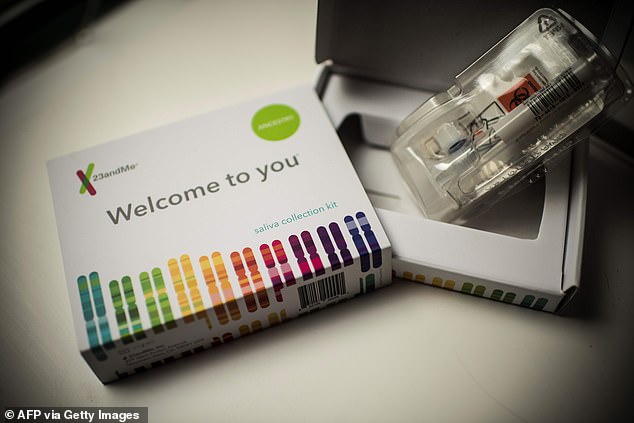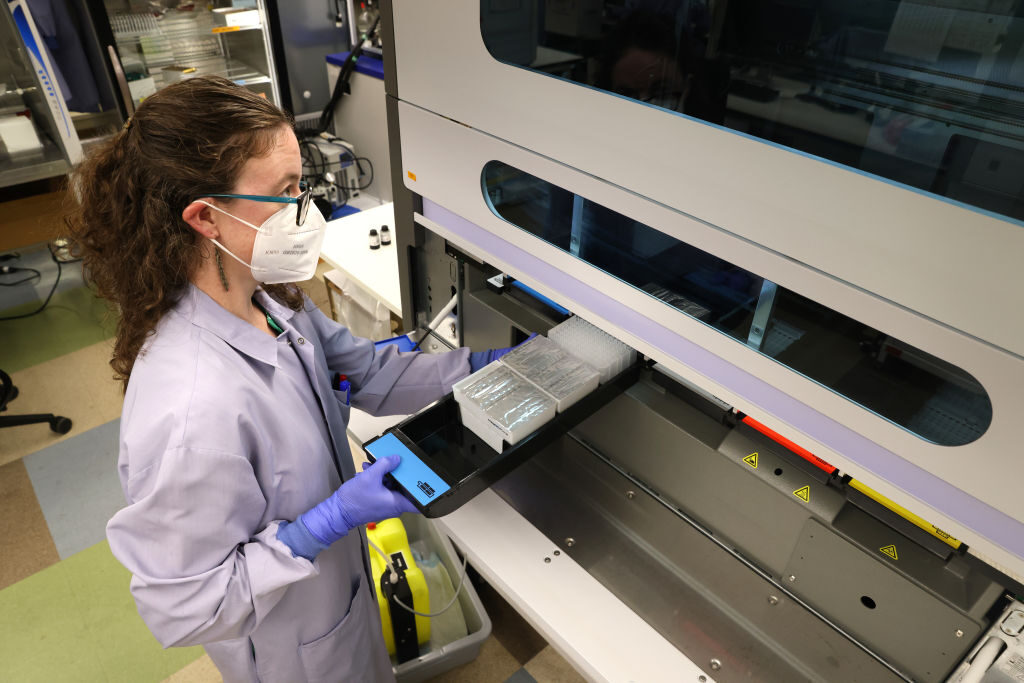More On: 23andMe
Members of the Intelligence Committee warn the US about bioweapons (flashback to China) that target the DNA of specific Americans
Rep. Jason Crow says that young Americans are too willing to share their DNA information. Warns people not to share health data with sites like 23andMe because it can be used to program new bio-weapons to target them
A member of the House Intelligence Committee told people not to use DNA testing services because the information could be used to make bioweapons that target specific groups or even single people in the United States.
Rep. Jason Crow, D-Colorado, said this at the Aspen Security Forum in Colorado on Friday. He said that too many Americans are too willing to give private companies their DNA information.
"You can't have a discussion about this without talking about privacy and the protection of commercial data because expectations of privacy have degraded over the last 20 years," Crow said "Young folks actually have very little expectation of privacy, that's what the polling and the data show."
"People will very rapidly spit into a cup and send it to 23andMe and get really interesting data about their background," he added.

Crow, who used to be an Army Ranger, then said that once a private company has a person's DNA, it can sell it. 23andMe has said that it has never sold customers' private information.

The congressman said the development of sophisticated bioweapons is worrisome given the popularity of DNA testing services, where people willingly share their genetic mapping with businesses to gain insight on their genealogy and health, the Daily Mail reports.

“You can’t have a discussion about this without talking about privacy and the protection of commercial data because expectations of privacy have degraded over the last 20 years,” the Democratic lawmaker said.
“Young folks actually have very little expectation of privacy, that’s what the polling and the data show.”
Crow, a former Army Ranger who served three tours of duty in Iraq and Afghanistan, continued: “People will very rapidly spit into a cup and send it to 23andMe and get really interesting data about their background.”
“And guess what? Their DNA is now owned by a private company. It can be sold off with very little intellectual property protection or privacy protection and we don’t have legal and regulatory regimes to deal with that.”
Crow went on to counsel that “an open and public discussion about… what the protection of healthcare information, DNA information, and your data look like because that data is actually going to be procured and collected by our adversaries for the development of these systems.”
In Dec, we learned @DeptofDefense banned US service members from using genetic testing kits like 23AndMe.
— Jim Banks (@RepJimBanks) January 13, 2020
I never want adversaries like #China #CCP gain access to the genetic code of millions of Americans and plan on doing more to protect American’s most sensitive personal info! https://t.co/lCez9NPrQg
Sen. Joni Ernst, a Republican from Iowa, also went to the forum. She said that enemies of the United States could use the same technology to kill livestock and crops to cause famine.
Crow and Ernst's warnings came on the same day that they expressed concern about cheap drones that can be used for military purposes and China and Russia's growing use of AI.

The U.S. and its enemies are looking into how to use drones and artificial intelligence (AI) together to make "swarms" of up to 200 drones that can move quickly across the battlefield.
"It's not just the one-offs that are being purchased on the internet, but now we have near-peer adversaries that are developing swarm technology where they can use 100 or 200 different drones — highly, highly evolved drones that can attack our service members on the battlefield," Ernst said.
Crow also said that U.S. research into drone technology must take moral and ethical issues into account. He admits that many of the U.S.'s enemies don't care about these things.
This week, the Washington Examiner wrote about how easily privately owned databases could be used to make bioweapons like the ones Crow talked about.
The article explained how someone could steal the DNA of a target or a close relative of a target and use it to make a biological weapon that would only work against that person.
This technology could lead to assassination programs that kill specific people, and it could also make it much harder to find killers.
The same kind of technology could be used against US agriculture by making weapons that only hurt certain kinds of crops or farm animals.
That could cause famine in the country and put the US on its knees if a rival like Russia or China attacked.
The head of the US Special Operations Command, Army General Richard Clark, pointed out that Russia had already made a name for itself with a less sophisticated version of the same plan.
In 2018, when Sergei Skripal, a former double agent, was poisoned in England with a nerve agent, he said, "Russia is willing to use those against political opponents." They are willing to use them on their own land, but they are also willing to use them on the land of a NATO ally in the UK. As we move forward, we need to be ready for this to happen.
"And I don't think we talk about it and look for ways to fight it as much as we should."
Skripal and his daughter Yulia were almost killed when the nerve agent Novichok was used to poison them in the English town of Salisbury. Theresa May, who was Britain's Prime Minister at the time, blamed Russia for the uproar a few days later.
US Sen. Marco Rubio raised the alarm last year when he said that Medicare and Medicaid DNA tests were being done in Russian and Chinese labs.
Rubio said in a statement, "It is ridiculous that our current policies allow the Chinese Communist Party to get access to genomic data about Americans."
"There is no reason why Beijing, which often tries to hurt US national security, should be given information about the genomes of US citizens."
Gizmodo says that in 2018, Ancestry, 23andMe, Habit, Helix, and MyHeritage all signed a policy that was written with the help of a non-profit called The Future of Privacy Forum. The goal of the policy was to "promote responsible data practices in support of emerging technologies."
The guidelines, called Privacy Best Practices for Consumer Genetic Testing Services and released on Tuesday, deal with situations in which users' personally identifiable and anonymous genetic information could be shared with law enforcement (without a warrant) and other third parties.
The new voluntary policies call for getting separate permission from users before sharing "individual-level information" with other businesses and making it clearer how many requests for data law enforcement gets and how many requests they fill.
Even though all of the companies have said they agree with these rules, there is no law that makes them stick.
GAG News reported that the Pentagon told the whole force in late 2019 not to use commercially available DNA testing kits to find out their ancestry because they were worried that China would get their DNA.
"There is growing concern in the scientific community that outside parties are using genetic data for questionable reasons, like mass surveillance and being able to track people without their permission or knowledge," the Pentagon said in an advisory from December 20, 2019, which Yahoo News was the first to report.
But neither the memo nor the Yahoo News report said that China was the biggest worry.
But two congressional sources told GAG News that China's attempts to get DNA and other personal health information from popular U.S. companies made the Pentagon worry.












